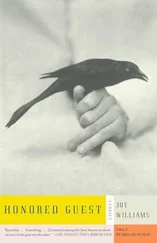Joy Williams - Taking Care
Здесь есть возможность читать онлайн «Joy Williams - Taking Care» весь текст электронной книги совершенно бесплатно (целиком полную версию без сокращений). В некоторых случаях можно слушать аудио, скачать через торрент в формате fb2 и присутствует краткое содержание. Год выпуска: 2010, Издательство: Vintage, Жанр: Современная проза, на английском языке. Описание произведения, (предисловие) а так же отзывы посетителей доступны на портале библиотеки ЛибКат.
- Название:Taking Care
- Автор:
- Издательство:Vintage
- Жанр:
- Год:2010
- ISBN:нет данных
- Рейтинг книги:5 / 5. Голосов: 1
-
Избранное:Добавить в избранное
- Отзывы:
-
Ваша оценка:
- 100
- 1
- 2
- 3
- 4
- 5
Taking Care: краткое содержание, описание и аннотация
Предлагаем к чтению аннотацию, описание, краткое содержание или предисловие (зависит от того, что написал сам автор книги «Taking Care»). Если вы не нашли необходимую информацию о книге — напишите в комментариях, мы постараемся отыскать её.
Taking Care — читать онлайн бесплатно полную книгу (весь текст) целиком
Ниже представлен текст книги, разбитый по страницам. Система сохранения места последней прочитанной страницы, позволяет с удобством читать онлайн бесплатно книгу «Taking Care», без необходимости каждый раз заново искать на чём Вы остановились. Поставьте закладку, и сможете в любой момент перейти на страницу, на которой закончили чтение.
Интервал:
Закладка:
The girl’s lover comes to the apartment. She throws herself into his arms. He looks wonderful. She would do anything for him! The child grabs the pocket of his jacket and swings on it with her full weight. “My friend,” the child says to him. “Why yes,” the man says with surprise. They drive the child to the nursery and then go out for a wonderful lunch. The girl begins to cry and spills the roll basket on the floor.
“What is it?” he asks. “What’s wrong?” He wearies of her, really. Her moods and palpitations. The girl’s face is pale. Death is not so far, she thinks. It is easily arrived at. Love is further than death. She kisses him. She cannot stop. She clings to him, trying to kiss him. “Be calm,” he says.
The girl no longer sees the man. She doesn’t know anything about him. She is a gaunt, passive girl, living alone with her child. “I love you,” she says to the child. “Mommy loves me,” the child murmurs, “and Daddy loves me and Grandma loves me and Granddaddy loves me and my friend loves me.” The girl corrects her, “Mommy loves you,” she says. The child is growing. In not too long the child will be grown. When is this happening! She wakes the child in the middle of the night. She gives her a glass of juice and together they listen to the radio. A woman is speaking on the radio. She says, “I hope you will not think me vulgar.” “Not at all,” the Answer Man replies. “He is never at a loss,” the girl whispers to the child. The woman says, “My husband can only become excited if he feels that some part of his body is missing” “Yes,” the Answer Man says. The girl shakes the sleepy child. “Listen to this,” she says. “I want you to know about these things.” The unknown woman’s voice continues, dimly. “A finger or an eye or a leg. I have to pretend it’s not there.”
“Yes,” the Answer Man says.
Summer

C ONSTANCE and Ben and their daughters by previous marriages, Charlotte and Jill, were sharing a summer house for a month with their friend Steven. There were five weekends that August, and for each one of them Steven invited a different woman up — Patsy, Teddy, Mercedes, Annie and Gloria. The women made a great deal of fuss over Charlotte and Jill, who were both ten. They made the girls nachos and root-beer floats, and bought them latch-hook sets and took them out to the moors to identify flowers. They took them to the cemeteries, from which the children would return with rubbings which Constance found depressing—
This beautiful bud to us was given
To unfold here but bloom in heaven
or worse!
Here lies Aimira Rawson
Daughter Wife Mother
She has done what she could
The children affixed the rubbings to the side of the refrigerator with magnets in the shape of broccoli.
The women would arrange the children’s hair in various elaborate ways that Constance hated. They knew no taboos; they discussed everything with the children — love, death, Japanese whaling methods. Each woman had habits and theories and stories to tell, and each brought a house present and stayed seventy-two hours. They all spent so much time with the children because they could not spend it with Steven, who appeared after five P.M. only. Steven was writing a book that summer; he was, in his words, “writing an aesthetically complex response to hermetic currents in modern life.” This took time.
Ben was recovering from a heart attack he had suffered in the spring. He and Constance had been in a restaurant, arguing, and he had had a heart attack. She remembered the look of absolute attentiveness that had crossed his face. At the time, she had thought he was looking at a beautiful woman behind her and on the other side of the room. The memory, which she recalled frequently, mortified her. What she couldn’t remember was what they had been arguing about.
Ben was thin with dark hair. He was twelve years older than Constance, yet they looked about the same age. He was the love of Constance’s life, but they quarreled a lot; it was a small tragedy, really, how much they had quarreled before his heart attack. Without their arguments they were a little shy with one another. Things appeared different now to Constance: objects seemed to have more presence, people seemed more vivid, the sky seemed brighter. Her nightmares’ messages were far less veiled. Constance was embarrassed at having these feelings, for it had been Ben’s heart attack, after all, not hers. He had always accused her of taking things too personally.
Constance and Ben had been married for five years. Charlotte was Constance’s child from her marriage with David, and Jill was Ben’s from his marriage with Susan. The children weren’t crazy about one another, but they got along. It was all right, really, with them. Here in the summer house they slept in the attic; in Constance’s opinion, the nicest room in the house. It had two iron beds, white beaverboard walls and a small window from which one could see three streets converging. Sometimes Constance would take a gin and tonic up to the attic and lie on one of the beds and watch people place their postcards in the mailbox at the intersection. Constance didn’t send postcards herself. She really didn’t want to get in touch with anybody but Ben, and Ben lived in the same house with her, as he had in whatever house they’d been in ever since they’d gotten married. She couldn’t very well send a postcard to Ben.
August was hot and splendid for the most part, but those who stayed for the entire season claimed it was not as nice as July. The gardens were blown. Pedestrians irritably swatted bicyclists who used the sidewalks. There was more weeping in bars, and more jellyfish in the sea.
On the afternoon of the first Friday in August, Constance was in the attic room observing an elderly couple place their postcards in the mailbox with great deliberation. She watched a woman about her own age drop a card in the box and go off with a mean, satisfied look upon her face. She watched an older woman throw in at least a dozen cards with no emotion whatever.
Charlotte came upstairs and told her mother, “A person drowning imagines there’s a ladder rising vertically from the water, and he tries to climb that ladder. Did you know that? If he would only imagine that the ladder was horizontal he wouldn’t drown.”
Charlotte left. Constance sat on a bed and looked around the room. On the bureau mirror were photographs of two little boys, Charlotte’s and Jill’s boyfriends. Their names were Zack and Pete. They were just little boys but there they were. It worried Constance that the children should already have boyfriends. Another photograph, which Constance had not seen before, showed a large yellow dog grinning in front of a potted evergreen. Constance was not acquainted with either him or his name. She got up and began picking up candy wrappers that were scattered around the room and putting them in her empty glass. She was thirty-three years old. She thought of F. Scott Fitzgerald’s line that American lives have no second act.
Constance went downstairs to the kitchen where Patsy was drinking some champagne she had brought, and waiting for Steven to appear at five o’clock.
“I just love it here,” Patsy said. “I love it, love it, love it.”
Her eyes were shining. She was a good sport but she had rather bad skin. She was a vegetarian; for three days after she left, the children demanded bean curd. She was Steven’s typist in the city, where she and her epileptic golden retriever Scooter lived in the same apartment building as Jill’s aunt.
“You were in my apartment a long, long time ago,” Patsy told Jill, “when you were a little tiny girl, and you pulled Scooter’s tail and he growled at you and you said, ‘Stop that at once,’ and he did.”
Читать дальшеИнтервал:
Закладка:
Похожие книги на «Taking Care»
Представляем Вашему вниманию похожие книги на «Taking Care» списком для выбора. Мы отобрали схожую по названию и смыслу литературу в надежде предоставить читателям больше вариантов отыскать новые, интересные, ещё непрочитанные произведения.
Обсуждение, отзывы о книге «Taking Care» и просто собственные мнения читателей. Оставьте ваши комментарии, напишите, что Вы думаете о произведении, его смысле или главных героях. Укажите что конкретно понравилось, а что нет, и почему Вы так считаете.












